U.S. giving Putin green light in Ukraine?
April 14, 2014 -- Updated 1523 GMT (2323 HKT)
STORY HIGHLIGHTS
- Gunmen seize key parts of eastern Ukraine; pro-Russian forces create instability
- David Frum: Remark that military intervention won't work implies West will look away
- Frum: Russia threatens stability of Europe; NATO observers need to monitor events
- He says sanctions must hurt Russian investments; Ukraine's weak military needs help
Editor's note: David Frum, a CNN contributor, is a contributing editor at The Daily Beast. He is the author of eight books, including a new novel, "Patriots," and a post-election e-book, "Why Romney Lost." Frum was a special assistant to President George W. Bush from 2001 to 2002. The opinions expressed in this commentary are solely those of the author.
(CNN) -- When Russia invaded and annexed Crimea, Western leaders warned Russia against trying the same trick in mainland Ukraine. Russia is now trying the same trick in mainland Ukraine.
Over the past several days, masked, heavily armed men have seizedstrategic locations in eastern Ukraine.
In Kharkiv, pro-Russian armed forces have occupied City Hall. In Donetsk, they have taken control of the regional legislature building and the interior ministry. In Luhansk, they have taken the compound of the state security agency. In the city of Kramatorsk, in the Donetsk region, armed men shot their way into police headquarters.
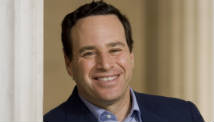
David Frum
Cell phone towers are being toppled through the area,according to Ukraine's acting interior minister, apparently with a view to silencing nonmilitary communications.
Uniformed men have established checkpoints around the city of Sloviansk, also near Donetsk. A gunfight erupted at one checkpoint on Sunday, apparently leaving two dead.
The Russians have infiltrated special forces into Ukraine over the past weeks and months. Now they are busily creating conditions of "instability" that could provide a pretext for outright Russian intervention, followed most likely by a partition of Ukraine and alignment of the eastern provinces toward Russia. In Crimea, Russian intervention has been followed by a campaign of "disappearances" of opposition and potential opposition figures. Inside Russia too, policy is turning again sharply repressive, symbolized by the spread of hammer-and-sickle flags at pro-Putin demonstrations.
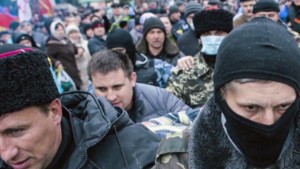
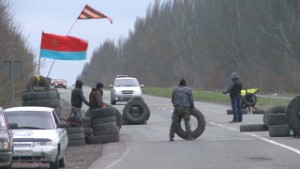
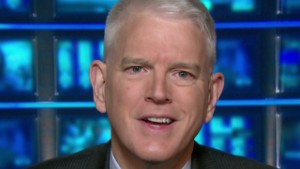
Europe outside the Balkans has known profound peace since 1991. Even the murderous wars in the former Yugoslavia, atrocious as they were, never threatened the general European peace. The Russians' actions in Ukraine do threaten the general peace. Russia is using military force -- as opposed to its usual tool kit of corruption, intimidation, and no-return-address assassination -- to reclaim former Soviet-occupied territory. In Ukraine, Russia has launched a war of reconquest. It's very hard to predict where that war will stop.
President Obama was very wrong in his speech in Brussels on March 26 to suggest that the United States had no national interest in Ukraine. What's at stake in Ukraine is the peace and stability of the European continent, an issue over which the United States fought two world wars. Yet the president has signaled to Russia that it need not fear any very robust U.S. or NATO response to its depredations in Ukraine.
More from the March 26 speech: "Of course, Ukraine is not a member of NATO -- in part because of its close and complex history with Russia. Nor will Russia be dislodged from Crimea or deterred from further escalation by military force."
When a president announces that he does not think a foreign aggressor's actions can be deterred, what message does that foreign aggressor hear? "Green light!" Unsurprisingly, Russia is driving right through that green light. The U.S. response? Over the weekend, the White House announced that Vice President Joe Biden will visit Ukraine on April 22, or not for another 10 days. Ten days from now, Putin could be standing under a "Mission Accomplished" banner in Kharkiv.
Every supposed benefit we receive from Obama's famed Russia "reset" is disintegrating before our eyes. News is arriving of another Syrian chemical attack, in the village of Kfar Zeita, 125 miles northeast of Damascus. Syria still holds most of the chemical warfare arsenal that was supposed to have been entirely surrendered to Russia by February 5. Russia has announced plans to bust up the international sanctions regime against Iran with purchases of 500,000 barrels of Iranian oil a day, potentially nearly doubling Iran's oil exports.
This is a rampage of mischief, far beyond one remote region of southeast Europe. And yet even as the threat to peace intensifies, the Western leaders and Western alliances charged with keeping the peace dither, fidget, and hem and haw.
The most urgent necessity now: deploy teams of NATO observers to the cities that are targets of Russian activity in eastern Ukraine. NATO needs eyes and ears on the ground -- and Russia must confront that it is fomenting an international crisis.
NATO needs rapidly to expand its permanent presence with the exposed eastern members of the alliance, especially the three Baltic republics. Such a move would violate the terms of the 1997 agreement with Russia on NATO expansion, which is precisely why it's an apt response to Russia's violation of the 1994 agreement on Ukraine's territorial integrity.
Ukraine needs help improving its military and police capacities. Russia is infiltrating forces across the border with pathetic ease. This is partly because Ukraine's wretchedly underpaid officials are easily bribed and partly because Ukraine's forces are too small, ill-equipped and untrained to do much even when not bribed.
The next round of sanctions on Russia should focus on banks and financial institutions that move the ill-gotten wealth of Russia's corrupt leadership to safe havens in the West. Putin's fortune is not stored in rubles. He's all too aware that someday, the kind of rebellion that toppled his Ukraine stooges might topple him.
It won't be easy to find that money, although of course NATO authorities should start the search. What is easier is to target institutions, Russian and Western, that move money out of Russia -- or that have suspicious clients from Russia.
In the longer term, Europe needs to shift its natural gas sourcing away from Russia. The U.S. will have to allow natural gas exports, and both Canada and the United States will need to induce private actors to build the liquid natural gas facilities that make exports feasible.
It's a big job. But we face a big threat.
Follow us on Twitter @CNNOpinion
Join us on Facebook/CNNOpinion
We recommend
From around the web
This State Has the Most Marijuana(FindTheBest)
Buying Land Over the Internet(Latino News Today)
April 14, 2014 -- Updated 1523 GMT (2323 HKT)
David Frum says Russia is on a rampage of mischief while Western leaders and Western alliances charged with keeping the peace hem and haw
April 14, 2014 -- Updated 1156 GMT (1956 HKT)
Most adults make the mistakes of hitting the snooze button and of checking emails first thing in the morning, writes Mel Robbins
April 14, 2014 -- Updated 1754 GMT (0154 HKT)
David Wheeler says as middle-class careers continue to disappear, we need a monthly cash payment to everyone
April 14, 2014 -- Updated 1155 GMT (1955 HKT)
Democrats need to show more political spine when it comes to the issue of taxes.
April 14, 2014 -- Updated 1555 GMT (2355 HKT)
Donna Brazile recalls the 50th Anniversary of the Civil Rights Act as four presidents honored the heroes of the movement and Lyndon Johnson, who signed the law
April 14, 2014 -- Updated 1317 GMT (2117 HKT)
Elmer Smith remembers Chuck Stone, the legendary journalist from Philadelphia who was known as a thorn in the side of police and an advocate for the little guy
April 13, 2014 -- Updated 1856 GMT (0256 HKT)
Al Franken says Comcast, the nation's largest cable provider, wants to acquire Time Warner Cable, the nation's second-largest cable provider. Should we be concerned?
April 11, 2014 -- Updated 1522 GMT (2322 HKT)
Philip Cook and Kristin Goss says the Pennsylvania stabbing attack, which caused grave injury -- but not death, carries a lesson on guns for policymakers
April 11, 2014 -- Updated 1906 GMT (0306 HKT)
Wikipedia lists 105 football movies, but all too many of them are forgettable, writes Mike Downey
April 11, 2014 -- Updated 1432 GMT (2232 HKT)
John Sutter and hundreds of iReporters set out to run marathons after the bombings -- and learned a lot about the culture of running
April 11, 2014 -- Updated 1649 GMT (0049 HKT)
Timothy Stanley says it was cowardly to withdraw the offer of an honorary degree to Ayaan Hirsi Ali. The university should have done its homework on her narrow views and not made the offer
April 11, 2014 -- Updated 1416 GMT (2216 HKT)
Almost three years after his death in a 2011 CIA drone strike in Yemen, Anwar al-Awlaki continues to inspire violent jihadist extremists in the U.S, writes Peter Bergen
April 12, 2014 -- Updated 0121 GMT (0921 HKT)
David Bianculli says Colbert is a smart, funny interviewer, but ditching his blowhard persona to take over the mainstream late-night role may cost him fans
April 10, 2014 -- Updated 1731 GMT (0131 HKT)
Rep. Paul Ryan says the Republican budget places its trust in the people, not in Washington
April 10, 2014 -- Updated 2128 GMT (0528 HKT)
Aaron David Miller says Obama isn't to blame for Kerry's lack of progress in resolving Mideast talks
April 14, 2014 -- Updated 1522 GMT (2322 HKT)
David Weinberger says beyond focusing on the horrors of the attack a year ago, it's worth remembering the lessons it taught about strength, the dangers of idle speculation and Boston's solidarity
April 10, 2014 -- Updated 1632 GMT (0032 HKT)
Katherine Newman says the motive for the school stabbing attack in Pennsylvania is not yet known, but research on such rampages turns up similarities in suspects and circumstances
April 11, 2014 -- Updated 1103 GMT (1903 HKT)
Simon Tisdall: Has John Kerry's recent track record left Russia's wily leader ever more convinced of U.S. weakness?
April 10, 2014 -- Updated 1640 GMT (0040 HKT)
Mel Robbins says Nate Scimio deserves credit for acting bravely in a frightening attack and shouldn't be criticized for posting a selfie afterward
April 9, 2014 -- Updated 1839 GMT (0239 HKT)
Wendy Townsend says the Rattlesnake Roundup -- where thousands of pounds of snakes are killed and tormented -- is barbaric
April 10, 2014 -- Updated 1345 GMT (2145 HKT)
Dr. Mary Mulcahy says doctors who tell their patients the truth risk getting bad ratings from them
April 9, 2014 -- Updated 1328 GMT (2128 HKT)
Peggy Drexler says the married Rep. McAllister, caught on video making out with a staffer, won't get a pass from voters who elected him as a Christian conservative with family values
April 9, 2014 -- Updated 1143 GMT (1943 HKT)
David Frum says the president has failed to react strongly to crises in Iran, Syria, Ukraine and Venezuela, encouraging others to act out
April 9, 2014 -- Updated 2057 GMT (0457 HKT)
Eric Liu says Paul Ryan gets it very wrong: The U.S.'s problem is not a culture of poverty, it is a culture of wealth that is destroying the American value linking work and reward
April 9, 2014 -- Updated 1151 GMT (1951 HKT)
Frida Ghitis writes: "We are still seeing the world mostly through men's eyes. We are still hearing it explained to us mostly by men."
April 10, 2014 -- Updated 1408 GMT (2208 HKT)
Chester Wisniewski says the Heartbleed bug shows how we're all tangled together, relying on each other for Internet security
April 9, 2014 -- Updated 1926 GMT (0326 HKT)
Danny Cevallos says an Ohio school that suspended a little kid for pointing his finger at another kid and pretending to shoot shows the growth in "zero tolerance" policies at school run amok
Most Popular
Today's five most popular stories
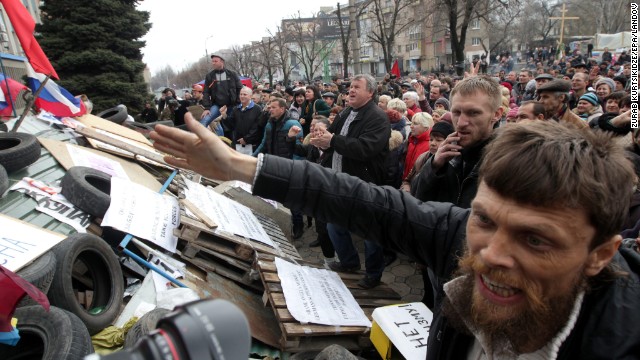 Russian supporters attend a rally in front of the security service building occupied by pro-Russian activists in Luhansk, Ukraine, on Monday, April 14. Ukraine has seen a sharp rise in tensions since a new pro-European government took charge of the country in February. Moscow branded the new government illegitimate and annexed Ukraine's Crimea region last month, citing threats to Crimea's Russian-speaking majority.
Russian supporters attend a rally in front of the security service building occupied by pro-Russian activists in Luhansk, Ukraine, on Monday, April 14. Ukraine has seen a sharp rise in tensions since a new pro-European government took charge of the country in February. Moscow branded the new government illegitimate and annexed Ukraine's Crimea region last month, citing threats to Crimea's Russian-speaking majority.












































No comments:
Post a Comment